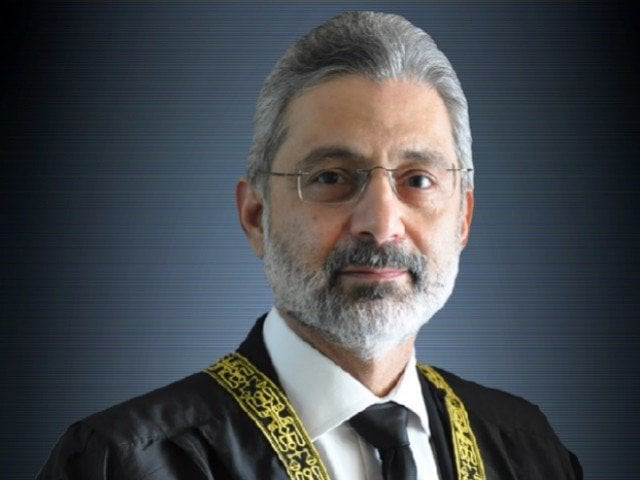Govt ready to face consequences in Justice Isa case: Naseem
Justice Isa submits fresh application, claiming that govt spied on him, his family

Justice Qazi Faez Isa. PHOTO: FILE
“We are ready to face consequences but the consequences would be across the board,” said Dr Naseem on Monday before a 10-judge full-court that was hearing a slew of petitions challenging the reference that was sent to the Supreme Judicial Council (SJC) in May 2019.
The reference sought Justice Isa’s removal alleging that he committed misconduct when he failed to mention in his wealth statement his family members’ properties in the United Kingdom.
The SJC – the only constitutional forum that can hold a superior court judge accountable – had later started proceedings on the basis of the reference and issued show-cause notices to Justice Isa, who is in line to become the chief justice of Pakistan.
Justice Isa and a number of other petitioners later challenged the reference and the SJC proceedings in the apex court. In his petition Justice Isa had accused the PTI led federal government of spying on him and his family to discover their foreign properties.
A member of the full court, Justice Maqbool Baqar, on June 4 asked the government to bear in mind the consequences in case it was unable to prove its case against Justice Isa.
The same judge on June 12 reminded the government’s counsel that a democratically elected PPP government had been sent packing in 1996 on charges of judges’ surveillance.
Presenting his arguments, Dr Farogh Naseem on Monday said it appeared as if the government functionaries – the prime minister, the president, and the law minister – were on trial and not the judge “who has yet to explain the source of income for his family members’ properties”.
Earlier, Justice Syed Mansoor Ali Shah observed that the government is also accountable if the reference is not maintainable. “There should be consequences if the reference is quashed after being found to be based on malice,” reiterated Justice Baqar.
Justice Umar Ata Bandial, the presiding judge, said no bar association had ever complained that Justice Isa was dishonest. None of the government’s allegations prove dishonesty of Justice Isa, he remarked.
Dr Naseem said a judge is the most powerful person in society, “and therefore, we must have confidence that the judge is free of controversy. The independence of the judiciary comes through integrity, and there should be good public perception of the judge.”
Justice Shah asked if the counsel admitted that this is a case pertaining to independence of the judiciary. He also asked him whether a husband could seek his wife’s tax records from the Federal Board of Revenue (FBR). Dr Naseem replied that he would have to ask the relevant officials.
“Under which law can the SJC ask a judge to disclose details of his wife’s properties,” inquired Justice Shah. He observed that the public perception of a judge can also be destroyed on social media.
Dr Naseem said fake news could not destroy public perception but if a judge is unable to explain the source of his family members’ properties then it would influence his reputation.
Justice Bandial noted that instead of relaying a violation of Section 116 of the Income Tax law, Dr Farogh Naseem was more concerned about getting the SJC issue show-cause notice to Justice Isa.
Talking with reference to the show-cause notices, Justice Maqbool Baqar noted that if the basis of the reference is illegal then all of the proceedings will be quashed.
Referring to various SC judgments, Dr Naseem said the office of a judge comes under the definition of public office and it is mandatory for a public servant that their family members’ lifestyle is not beyond the ostensible source of income. He maintained that his case is about the source of income.
The bench asked Dr Naseem yet again as to why the government did not question Justice Isa’s wife about her source of income for the said properties. If the wife purchased these properties through inherited income, would the judge be liable to reply, asked Justice Shah.
Justice Yahya Afridi asked whether all judges should be asked about their family members’ tax concerns by the SJC or by tax authorities. Dr Naseem said disciplinary proceedings against a judge could only be initiated by the SJC.
Justice Isa’s application
Submitting a fresh 8-page application, Justice Qazi Faez Isa has claimed that names and property details of his family were gathered through surveillance.
“The contesting respondents [government functionaries] still do not provide the particulars of the alleged searches of my family members’ properties after 14 long months,” he said.
He said he has continuously, and from the beginning, maintained that complainant – Abdul Waheed Dogar, on whose complaint the reference was filed – is a proxy, and his conduct is none too salubrious.
“He plants false stories, destroys reputations, protects the perpetrators of violence, places hurdles in the way of the police and misleads them away from the real criminals.
“Is it then not reasonable to assume that those who had severely beaten Mr Ahmad Noorani [a journalist who covers the SC] are his real employers and controllers,” he noted. He said the malice, mala fides and ulterior motives of the contesting respondents are self-evident by their continued commitment and devotion to the proxy [Dogar], whom they have used to build the house-of-cards reference against the petitioner.
Justice Isa said his wife’s name appears as owner of three properties – situated in the W2, E10 and E11 areas of London. The name of the petitioner’s daughter appears as owner of two properties –W2 and E10 – and the petitioner’s son allegedly owns property –E11.
"Therefore, a minimum of three 192.com searches (with separate payments) had to be conducted to discover their properties. Thereafter, HM Land Registry searches are said to have been conducted; at least three HM Land Registry searches, one for each property.
“The minimum number of searches would come to six, that is, three 192.com searches and three HM Land Registry searches. However, the contesting respondents have not filed the complete search record of even one search, let alone for all six. Why do they do not do so,” he noted.
He said no search as stated was ever conducted and the names and property details of the petitioner’s family members were gathered through surveillance.
He said the identity of those who had conducted the searches and those who paid for them is concealed. If the referred to documents are provided, they will reveal that Dogar was a proxy.
“A question to be answered by the contesting respondents is whether they are entitled to conceal material information and mislead this Hon’ble Court?
“Let us extend the maximum benefit of doubt to the contesting respondents, even though none is extended to the petitioner, and assume that the complete names and exact spellings of the petitioner’s family were known to them without resort to surveillance.
“Still, only someone with an email address, a debit/credit card, a mobile phone and a bank account could utilize the services provided by 192.com and HM Land Registry; to write and receive emails, to make electronic payments, to receive SMSs on a mobile phone and a bank account from which payments are debited,” he added.
This week is crucial for the case, as the apex court is likely to conclude the hearing. The 10-member bench has already conducted 36 hearings of the case.












1724319076-0/Untitled-design-(5)1724319076-0-208x130.webp)






COMMENTS
Comments are moderated and generally will be posted if they are on-topic and not abusive.
For more information, please see our Comments FAQ